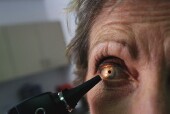- Could Your Grocery Store Meat Be Causing Recurring UTIs?
- Are You Making This Expensive Thermostat Error This Winter?
- Recognizing the Signs of Hypothyroidism
- 10 Strategies to Overcome Insomnia
- Could Artificial Sweeteners Be Aging the Brain Faster?
- Techniques for Soothing Your Nervous System
- Does the Water in Your House Smell Funny? Here’s Why
- Can a Daily Dose of Apple Cider Vinegar Actually Aid Weight Loss?
- 6 Health Beverages That Can Actually Spike Your Blood Sugar
- Treatment Options for Social Anxiety Disorder
High Blood Pressure May Boost Glaucoma Risk


Long-term high blood pressure may increase the risk of the eye disease glaucoma, according to a new study.
The researchers said their findings suggest that doctors should consider a patient’s blood pressure when managing glaucoma, the second leading cause of blindness in the world.
Glaucoma occurs when excessive pressure inside the eye pushes back against blood trying to enter the eye. It had been thought that because high blood pressure (hypertension) ensures that blood can enter the eye, it could counteract the high eye pressure that causes glaucoma.
However, this study of short-term (one hour) and long-term (four weeks) high blood pressure in rats with elevated eye pressure found that long-term high blood pressure actually increases the risk of glaucoma.
The study was published recently in the journal Investigative Ophthalmology & Visual Science.
“When we raised blood pressure . . . for four weeks, we didn’t get the same protection against eye pressure elevation as in the [one-hour] case,” study author Bang Bui, from the department of optometry and vision sciences, at the University of Melbourne in Australia, said in a journal news release.
“What this means is that having high blood pressure for a longer time has compromised the eye’s capacity to cope with high eye pressure,” Bui explained. “It seems that hypertension might damage the blood vessels in the eye so that they can’t compensate for changes in blood flow when eye pressure increases.”
These findings may help doctors treat people with glaucoma. Instead of regarding high blood pressure as benefiting patients with the eye disease, it should be considered a risk factor for glaucoma, Bui said.
Further research is needed to determine the best way to treat people with high blood pressure who also develop glaucoma, according to the researchers.
Scientists note that research involving animals often fails to produce similar results in humans.
More information
The U.S. National Eye Institute has more about glaucoma.
Source: HealthDay
Copyright © 2026 HealthDay. All rights reserved.










